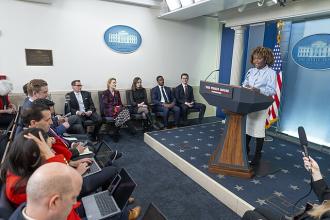Sleep experts and psychologists widely agree that adolescents should be waking up later in the day.
The American Academy of Sleep Medicine published a new position statement Saturday urging middle schools and high schools to push their start times to 8:30 a.m. or later to accommodate older students' needs for restful sleep. Forcing kids to be at their desk by 8 a.m., 7:30 a.m. or earlier can have a detrimental effect on their health and their ability to learn, sleep doctors say. And strong scientific research shows that starting school later produces a wide range of benefits for adolescents.
"Early school start times make it difficult for adolescents to get sufficient sleep on school nights, and chronic sleep loss among teens is associated with a host of problems, including poor school performance, increased depressive symptoms, and motor vehicle accidents," said lead author of the statement and former President of AASM Dr. Nathaniel Watson. "Starting school at 8:30 a.m. or later gives teens a better opportunity to get the sufficient sleep they need to learn and function at their highest level."
Around 68 percent of students report sleeping about 7 hours or less a night, according to the Centers For Disease Control and Prevention — much less than the 8 to 10 hours recommended in the new AASM statement. The academy notes that being sleep deprived is associated with a range of negative outcomes for students, including:
- Poor school performance
- Obesity
- Metabolic dysfunction and cardiovascular morbidity
- Increased depressive symptoms
- Suicidal ideation
- Risk-taking behaviors
- Athletic injuries
Research also shows that when middle school and high school start times are pushed later, students fare much better. Schools that implement this change can expect students to show:
- Longer total sleep time
- Reduced daytime sleepiness
- Increased engagement in class activities
- Reduced first-hour tardiness and absences
- Reduced depressive symptoms and irritability
- Improved reaction time
Along with the AASM, the American Psychological Association, the Centers for Disease Control and Prevention, the National Sleep Foundation and the American Academy of Pediatrics have all endorsed later school start times for these reasons.
As Patch reported in a story last year, these facts about adolescent sleep needs have been widely known for a long time. "All the research has always indicated, especially for kids in middle school and high school, that they would do better if they started later," Susan Lipkins, a psychologist who specializes in children, told Patch.
"For many people in their growth spurt, which is in middle and high school, their bodies are telling them to go to sleep later, and to sleep later in the day," she said. "They also need more sleep as they grow because you’re actually physically growing while you sleep."
And unlike some scientific topics that split researchers into conflicting camps, the topic of later school start times for adolescents elicits virtually unanimous agreement among experts.
"The biology which creates the early-morning sleepiness [in young adults] is clear cut, the effect that it has is clear cut,"Timothy Roehrs, a researcher at the Henry Ford Hospital sleep disorders clinic, told Patch. "There’s a shift in their circadian rhythm to a later bedtime and a later time of rising. And that’s unlike young children, before they have matured."
Of course, making a change to school start times is not easy. School administrators have to coordinate with neighboring districts, community members, parents, teachers unions, other schools and bus schedules; major shifts can make make many of these groups unhappy. But much of education is about promoting the welfare of students. Can we say we're doing a good job of that if we don't at least try to overcome the practical obstacles to a change we know would make them better off?
When we send our kids to school, we ask them to sit down, be quiet and pay attention. The least we can do in return is let them get a little rest.















